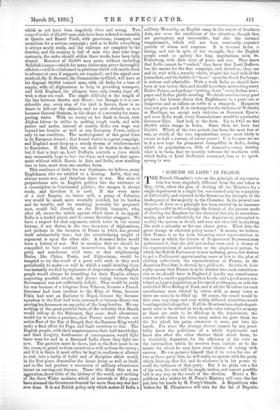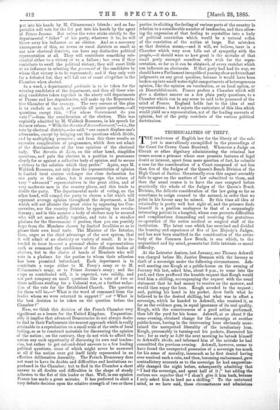, sonuriN DE LISTE" IN FRANCE. , sonuriN DE LISTE" IN FRANCE.
THE French Chamber's vote on the principle of representation has been singularly different from the one taken in May, 1881, when the plan of electing all the Members for a
single department in a single list, was carried only by a majority of 243 to 235, and rejected in the Senate on the strength of the inadequacy of the majority in the Chamber. In the present case Scrutin de Liste as a principle has been carried by an immense majority-418 to 66—though the friends of the present mode of electing the Members for the electoral distticts or arrondisse ments, and not collectively for the department, attempted to modify the system in detail, and were not then left in anything like such a minority as the one above given. What does the great change in electoral policy mean? It means, we believe, that France is so far from favouring exact representation in
the sense in which the friends of Proportional Representation understand it, that she will not endure even such a chance of the representation of minorities as the single-seat system, to which the British Parliament is now inclining, gives, but desires to get a Parliament approximating more or less to the plan of electing collectively the representatives of France, as the American President is elected, by a ple'biscite. Scrutin de Lite really means that France is to be divided into such constituencies as we should have in England if hardly any constituency contained a smaller population than Leeds, and a good many contained as large a population as Liverpool or Glasgow, or even the undivided West Riding of York, and if all the Members for each constituency were elected by voters with as many votes as there are seats to be filled up. Of course, the result would be that even very large and very widely-diffused minorities would be extinguished altogether. If all the Members for a single department were to be elected in block, each voter voting for as many as there are seats to be filled-up in the department, the voter would throw his votes away unless he gave them for the list which his party, whatever it were, put into his hands. For since the average elector cannot by any possibility know the politicians of a whole department and know also what the other electors think about them, he is absolutely dependent for the efficiency of his vote on the information which he receives from outside as to the names for which he may have some chance of voting with success. He can promise himself that if he votes for one of two or three party lists, he will really co-operate with the party which drew-up that 16t, and do whatever is in his power to swell the influence of that party. But if he picks out a list of his own, his vote will be simply useless, and cannot possibly tell in any way on the result of the election. Hence a Republican who wishes for M. Ferry's Ministry will vote the list put into his hands by M. Ferry's friends. A Republican who wishes for M. Clemenceau will vote for the list of Deputies pat into his hands by M. Clemenceau's friends ; and an Imperialist will vote for the list put into his hands by the agent of Prince Jerome. But unless the voter sticks strictly to the departmental " ticket " of his party, whatever it be, he will throw away his influence as an elector. And as a necessary consequence of this, no towns or rural districts so small as our new electoral districts, can have any distinctive political representation at all. They will contribute something substantial either to a victory or to a failure ; but even if they contribute to swell the political victory, they will exert little or no influence in selecting the prrsonnel of the candidates by whom that victory is to be represented ; and if they only vote for a defeated list, they will fall out of count altogether in the Chamber when elected.
In a word, a departmental plebiscite is to be taken for the winning candidates of the department, and then all these winning candidates taken together in the ninety odd departments of France and her dependencies, will make up the Representative Chamber of the country. The very essence of the plan is to exclude as much as possible all minor questions,—all questions except this, "For whose Government do you vote ?"—from the consideration of the electors. This was explicitly admitted by M. Waldeck Rousseau, in his speech for the new reform. " With the Scrutin d'Arrondissement,"—i.e., the vote by electoral districts,—he said, "one cannot displace one's adversaries, except by bringing out the questions which divide, and by multiplying promises ; and from this there results an excessive complication of programmes, which does not admit of the discrimination of the true opinions of the electoral body. The Scrutin de Lisle, on the other hand, simplifies questions, and puts the electors in a position to pronounce clearly for or against a collective body of opinion, and to secure a victory to the solution which they prefer." Again, says M. Waldeck Rousseau, not only does the representation of opinion in limited local centres endanger the clear declaration for one party or the other, but it encourages the return of very "advanced" representatives in the great cities, and of very moderate men in the country places, and this tends to divide the party. The departmental mode of voting, on the other hand, will compel the party to choose a list which will represent average opinion throughout the department, a list which will not alienate the great cities by appearing too Conservative, nor the country districts by appearing too revolutionary; and in this manner a body of electors may be secured who will act more solidly together, and vote in a steadier phalanx for the Government it prefers, than you can possibly hope from the Members chosen by limited localities so as to please their own local taste. The Minister of the Interior, then, urges as the chief, advantage of the new system, that it will admit of no elasticity or variety of result. It is intended to issue in—not a personal choice of representatives such as command the confidence of the different bodies of
electors, but in the choice of bands of Members who will vote in a phalanx for the parties to whom their adhesion has been promised beforehand. Each department is to -contribute a corps either to M. Ferry's army or to M. 0:6menceau's army, or to Prince Jerome's army ; and the carps so contributed will, it is expected, vote solidly, and not part company on small questions like a vote of two or three millions sterling for a Colonial war, or a farther reduc
tion of the vote for the Established Church. The question for them will be,—" What is the word of command from the leader whom we were returned to support I" not "What is the beat decision to be taken on the question before the Chamber V"
Now, we think this decision of the French Chamber very significant as a lesson for the United Kingdom. Unquestion ably it implies that advanced Democracies do not always desire to find in their Parliaments the nearest approach which is really attainable to a reproduction on a small scale of the units of local feeling, so as to construct materials for discovering the opinion of the nation ; on the contrary, they do not wish to afford the nation any such opportunity of discussing its own real tenden cies, but rather to get cut-and-dried answers to a few leading political questions, some of which might never be answered at all if the nation once got itself fairly represented in an effective deliberative Assembly. The French Democracy does not want to have its doubts and difficulties and hesitations reproduced in the Chamber; but to Sncl in the Chamber a short answer to all doubts and difficulties in the shape of steady adhesion to the flat of this leader or that. Well, in our opinion France has made a great mistake. It has preferred to elicit a very definite decision upon the relative strength of two or three
parties, to eliciting the feeling of various parts of the country in relation to a considerable number of tendencies, and then allowing the expression of that feeling to crystallise into a body of political conviction which would be a • natural reflex of the conviction of the nation at large. But mistaken as that decision seems,—and it will, we believe, issue in a Chamber which very soon falls out of sympathy with the people,—it should warn us how great is the mistake of that small party amongst ourselves who wish for the representation, so far as it can be obtained, of every crotchet which can influence an electorate. If that party had had its way, we should have a Parliament incapable of passing clear and trenchant judgments on any great question, because it would have been broken-up into small water-tight compartments of heterogeneous opinion, like the opinion on vaccination, or on local option, or on Disestablishment. France prefers a Chamber which will give a distinct answer on a few plain party questions, to a Chamber which can in any sense be said to be possessed of the mind of France. England holds fast to the idea of real representation ; but it rejects the caricature of this idea which would yield us a representation, not of the leading currents of opinion, but of the petty crotchets of the various political doctrinaires. •



































 Previous page
Previous page